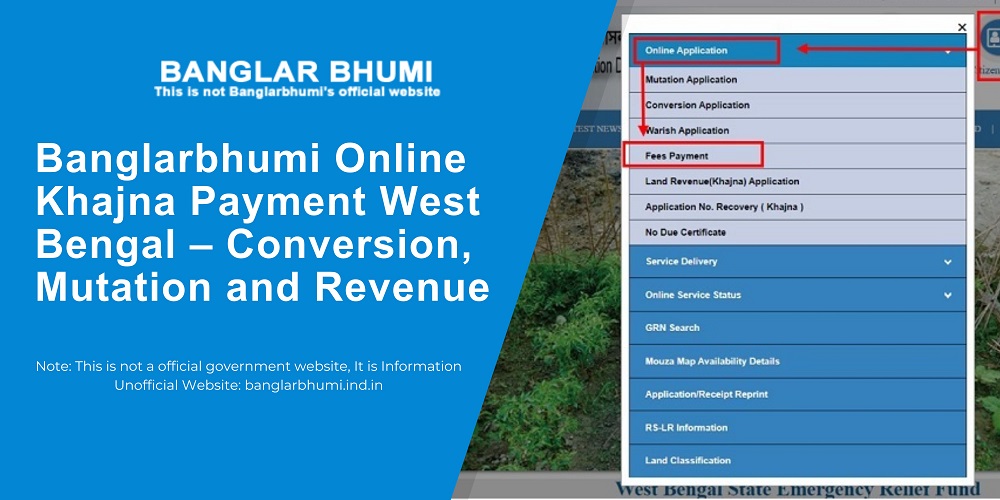You can pay the fee online after completing the conversion, mutation and online fee payment application.
Step 1: Access the Banglarbhumi Portal
To initiate the process, open your web browser and visit the official Banglar bhumi portal. You can do this by typing “Banglarbhumi” into your search engine.

Step 2: Navigate to the Fees Payment Section
Once on the Banglar bhumi portal, look for the option related to Fees Payment. This is usually found in the Citizen Services”. Click on the appropriate link to proceed.
- Go to Banglarbhumi Homepage.
- Click on Citizen Services.
- Click on Online Application.
- Fees Payment
Step 3: Pay Fees for the following services :
- Conversion
- Mutation
- Khajna (Revenue)
Now, select the Request Type then Enter your Application No. and solve the Captcha After that click on the View button.
You will get the Fees Details on your Screen Now Pay the Fees Amount.
Step 4: Providing Property Details
- Enter accurate details about your property.
- Including the plot number, district, and other relevant information.
- Double-check the entered details to avoid any discrepancies in the pazyment process.
Step 5: Verifying Dues and Calculating Payment
- The system will display any outstanding dues or pending payments associated with your property.
- Use the online calculator, if available, to determine the exact amount you need to pay, including any applicable taxes or fees.
Step 6: Choosing Payment Method
- Select your preferred payment method from the available options – credit/debit card, net banking, or other online payment modes.
- Ensure that your chosen payment method is secure and compatible with the website’s payment gateway.
Step 7: Making the Payment
- Enter the necessary payment details, such as card number, CVV, and expiration date, or authenticate the transaction through your chosen payment method.
- Review the payment summary before confirming the transaction to avoid errors.
Step 8: Acknowledgment and Receipt
- Upon successful payment, the system will generate an acknowledgment receipt.
- Download and print the receipt for your records, as it serves as proof of payment for future reference.
Step 9: Post-Payment Verification
- Verify the payment status on the website or through any confirmation emails or messages received.
- In case of any discrepancies, contact the designated helpline or customer support for assistance.
Step 10: Additional Tips and Troubleshooting
- If you encounter any issues during the payment process, check your internet connection and browser compatibility.
- For further assistance, refer to the FAQ section on the website or contact the support team for guidance.
Conclusion:
Banglarbhumi Online Khajna Payment following these step-by-step instructions, you can easily make online Khajna payments in West Bengal, ensuring a seamless and efficient transaction.
Embrace the convenience of digital platforms to simplify your land revenue payments and contribute to the overall ease of administrative processes in the state.
FAQ:
1. What is Khajna?
Answer: Khajna, also known as land revenue tax, is a tax levied by the government on agricultural land ownership in some Indian states. It is a source of income for the state government used to fund various public services and infrastructure projects.
2. Can I pay Khajna online?
Answer: Yes, you can pay Khajna online in several Indian states. However, the availability and specific process may vary depending on your state government.
3. Which states in India offer online Khajna payment?
Answer: Currently, states like West Bengal, Andhra Pradesh, and Karnataka offer online Khajna payment facilities. It’s advisable to check with your state government’s official website for confirmation and specific details.
4. How do I find my Khajna amount online?
Answer: Many state government websites offer facilities to check your Khajna amount online. You’ll usually need your land record details to access this information.
5. Is online Khajna payment safe?
Answer: Using official government websites and portals for online Khajna payment is generally considered safe. However, practicing good online security habits like using strong passwords and avoiding suspicious links is always recommended.



